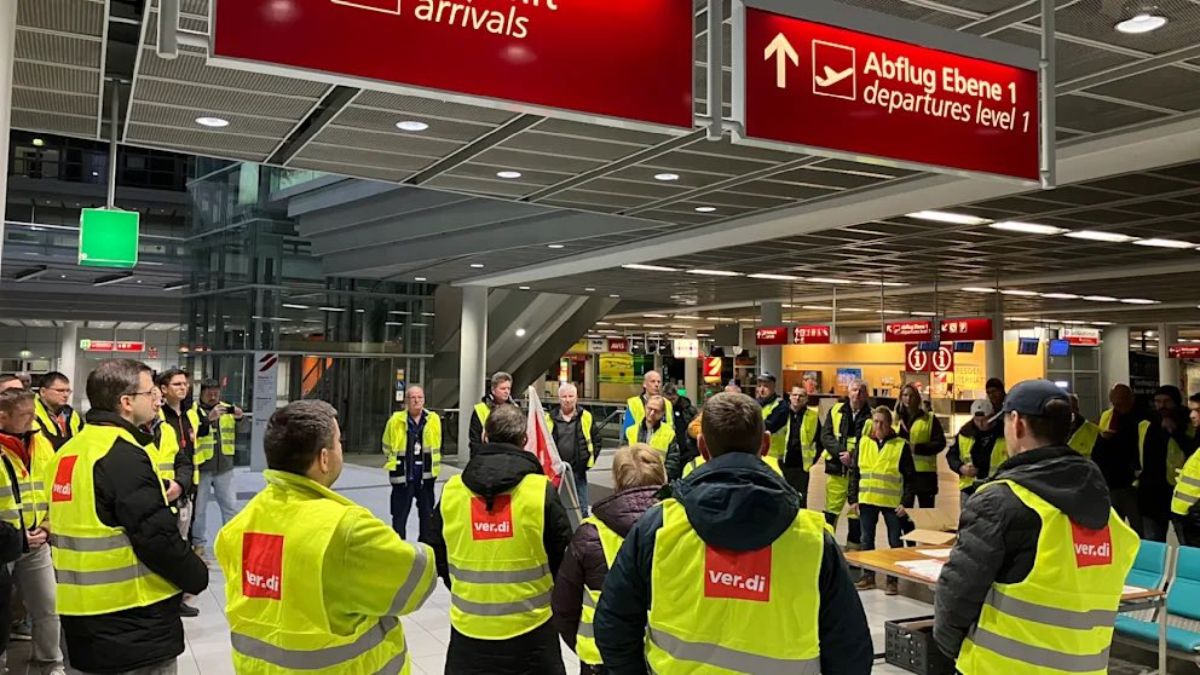
A nationwide strike initiated by airport workers in Germany has caused significant disruptions for passengers at 11 airports. The strike spells trouble for approximately 200,000 travellers, with over 1,100 flights experiencing cancellations or delays. Here’s all you need to know:
Strike at German airports
Ver.di trade union reports that airports impacted by the decrease in security staff include Hamburg, Bremen, Hanover, Berlin, Köln-Bonn, Düsseldorf, Leipzig, Dresden, Erfurt, Frankfurt am Main, and Stuttgart. Consequently, the Airport Association ADV anticipates that over 1,100 flights may face cancellations or delays. Tagesschau quoted ADV CEO Ralph Beisel, stating, “The strike brings unfortunate news for German airports and nearly 200,000 passengers.”
Air travelers should brace themselves for substantial disruptions as the ver.di union initiated warning strikes at eleven airports. Ver.di Chief Werneke described the working conditions as “catastrophic.”
Read also: The €49 ticket for public transport in Germany to remain unchanged in 2024
Airline passengers are facing another round of challenges as the ver.di union has called for warning strikes in aviation security. The strike commenced on Wednesday evening in Cologne-Bonn and Hanover, leading to the cancellation of overnight flights. Leipzig/Halle also experienced several cancellations on Wednesday evening.
The situation at Cologne/Bonn airport further deteriorated with the onset of the overnight strike. A spokesperson reported, “Almost all flights are cancelled” in the morning. Düsseldorf Airport is expected to see around a third of take-offs and landings cancelled, with some flights being redirected to Münster/Osnabrück. Despite the disruptions, Tagesschau notes that waiting times for flight authorization at Düsseldorf Airport remained within acceptable limits.
What’s happening with Lufthansa long-haul flights?
The strike has extended to Germany’s largest airport, Frankfurt. Fraport, the operator, has declared that security controls outside the transit area will be closed, making it impossible to board flights from Frankfurt. Initially, out of 1,120 planned flight movements, approximately 310 were cancelled, as reported by a Fraport spokesman.
Read also: Get up to 3,000 euros with the new inflation bonus in Germany
Despite the disruptions, major customer Lufthansa has stated its intention to uphold most of its scheduled flights to Frankfurt, including long-haul flights. The airline assured that the majority of long-haul flights would proceed as planned, and arrivals and return flights for connecting passengers would also be operated.
In the morning, there were no reported irregularities in the transit area, according to the Fraport spokesman. The checks for individuals transferring from non-Frankfurt flights originating from secure countries were said to be conducted within the approved emergency service framework.
More than 1,100 flights affected by strike
Eleven German airports are currently experiencing a strike, with security staff stoppages reported by ver.di. The affected airports, as listed by ver.di, include Hamburg, Bremen, Hanover, Berlin, Köln-Bonn, Düsseldorf, Leipzig, Dresden, Erfurt, Frankfurt/Main, and Stuttgart. The Airport Association ADV estimates that over 1,100 flights are at risk of cancellations or delays as a consequence of the strike.
Warning strikes are anticipated to begin based on shift start times, and normal flight operations are not expected to resume until Friday.
Read also: German government increases monthly Wohngeld subsidy by €190 on average

The strike lasts until midnight
Ver.di is advocating for improved wages for its roughly 25,000 employees through the current shutdowns. It’s worth noting that the collective bargaining partners are not the airports directly but rather the Federal Association of Aviation Security Companies (BDLS). The upcoming negotiation rounds are scheduled for February 6 and 7.
The strike is anticipated to continue until shortly before midnight. Ver.di justifies this action by citing stalled collective negotiations with BDLS. Despite three rounds of talks, no agreement was final. The employer claims that a negotiable offer was presented in the last round, which the union outright rejected.
